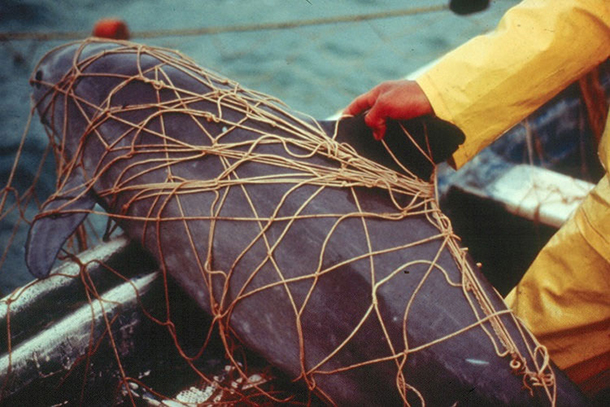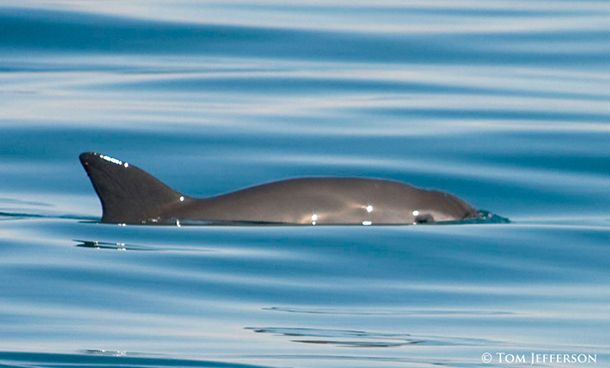Small Whale Entangled in Big Threat
Air Date: Week of January 20, 2017

A deceased vaquita killed by a gillnet used for catching totoaba. (Photo: Omar Vidal / NOAA Fisheries West Coast, Flickr CC BY-NC-ND 2.0)
The vaquita, the world’s smallest whale, lives only in Mexico’s Gulf of California and is critically endangered, due to illegal fishing. Now the Center for Biological Diversity plans legal action against the U.S. government for its failure to sanction Mexico for not stopping the poaching. Living on Earth’s Steve Curwood spoke with CBD’s Sarah Uhlemann about the threats vaquita face, and the legislative efforts to save them.
Transcript
PALMER: It’s Living on Earth, I’m Helen Palmer, in for Steve Curwood. The world’s smallest whale, the Vaquita, lives only in the Gulf of California off Mexico’s Northwest coast. It’s critically endangered, and now illegal fishing is helping drive it towards extinction. On January 5, the US-based Center for Biological Diversity issued an official warning of legal action to the US government, asking it to put pressure on Mexico to control the poaching. To find out more, Living on Earth host Steve Curwood called up Sarah Uhlemann, the International Program Director for the Center for Biological Diversity.
CURWOOD: First, just explain to us what is the vaquita whale.
UHLEMANN: So, a vaquita is the world's smallest porpoise. It's tiny. It's only about five feet long. It's gray with some black splotches around its mouth and its eyes, giving it what some people refer to as a bit of a Goth look, but I find it a bit unkind. It really lives only in one place on Earth, and that is in Mexico's Gulf of California on the very very top northern corner. This was a species that was only first identified by scientists back in the 1950’s -- it's pretty new to science. But scientists believe that even since its identification in the 50’s it has been declining.
CURWOOD: Now, why is the vaquita so important to the Gulf of California ecosystem and how exactly is it threatened?
UHLEMANN: So, vaquita are the rarest porpoise in the world. They're evasive. They're very shy. They swim away from boats. They consume a lot of fish. They are just an integral part of a very very amazing ecosystem. Jacques Cousteau called this habitat, the Gulf of California, "the aquarium of the world," and this is one of the key species in the aquarium of the world. vaquita face really one threat, and really one threat, and that is entanglement in fishing gear, a particular kind of fishing gear called gillnet gear. So gillnet gear is essentially two buoys that are up on the surface and the line that runs in between him and then the net that sort of hangs down below. Gillnets are very effective at capturing whatever fish a fisherman is targeting. But they are unfortunately also very effective at capturing pretty much anything that swims by including, unfortunately, the vaquita. vaquita get wrapped up in the net and they, of course, need to breathe, but they aren't able to get up to the surface and so they drown. It's a pretty rough way to go if you're if a vaquita.
CURWOOD: So, just how many of these vaquita are getting caught in gillnets by fisherpeople?
UHLEMANN: Well, we're not 100 percent sure, but we know that there's a lot. So, for about 30 years, we know that vaquita were getting caught in gillnet gear in trying to target shrimp. The population declined and declined until about 2008 when we knew there were only about 250 vaquita left. That's really small. Unfortunately, for the vaquita in 2011 there was a huge surge in fishing for another fish called the totoaba. totoaba is an enormous fish. It's five feet long, so actually just about the same size as a vaquita. It is in demand in China for its swim bladder, which is this organ that helps the fish stay afloat essentially. People in China believe ... some people in China believe that the bladder when it's dried and then reconstituted into a soup, it a can improve fertility and improve skin tone. Of course, there's no scientific evidence to support that, but nonetheless, totoaba bladders are in enormous demand. totoaba bladders regularly sell for about 14,000 U.S. dollars.

A vaquita surfaces in the Gulf of California for a quick breath. Typically vaquitas come up for only three seconds at a time. (Photo: Tom Jefferson / NOAA Fisheries West Coast, Flickr CC BY-NC-ND 2.0)
CURWOOD: Oh my.
UHLEMANN: And some of the really really big -- you know -- great bladders can sell for up to 50,000 dollars a piece. These are insanely lucrative fish. They are also, as you can imagine, endangered, and fishing for them is illegal in Mexico and trade of them internationally is entirely banned. But, because of that price there's so much totoaba fishing going on in Mexico and unfortunately to catch totoaba, you use a gillnet which is exactly what vaquita get entangled in.
CURWOOD: And so, this is all going on in Mexico, Sarah.
UHLEMANN: Yes.
CURWOOD: Why are you taking the first steps in a lawsuit against the United States government to protect the vaquita?
UHLEMANN: Well, I think everyone acknowledges that ultimately the fate of the vaquita lies in the hands of the Mexican government. It's a Mexican species and Mexico needs to get ahold of its Totoaba poaching problem. But the U.S. also has an important part to play. It wields a really heavy hammer. So there is a law on the books in the United States called the Pelly Amendment, and this law says that at any time the U.S. government finds that any nation is violating a wildlife treaty, that it can certify that nation, that is formally notify the nation, and if a nation is certified, then the President can sanction the country, so usually through embargoes or a ban on imports of some kind of wildlife product.
So, back in 2014, my organization filed a petition requesting the government to certify Mexico for violating the CITES treaty, this is the Convention on International Trade in Endangered Species, it governs trade and imperiled species. Both the Totoaba and the vaquita are protected under this treaty. So, argue that Mexico is failing to enforce the ban on trade in Totoaba, and thus is violating the CITES treaty. Now, if the U.S. government does certify Mexico for these violations, which we hope that they will, President-elect Trump will have the authority to sanction Mexico. So the opportunity to embargo products, likely shrimp from Mexico, until Mexico can solve this problem, until it can get the gillnets out of the water.
CURWOOD: But so far you're saying the outgoing Obama administration has been unresponsive, which is why you're taking these first steps to bring them in to court. What do they say when they don't respond to your request that they intervene here.
UHLEMANN: Well, so we filed our petition two-and-a-half years ago. We've had a number of meetings with the Obama administration. They understand that there's a problem and the U.S. government has been working to push Mexico, and we understand that they've been using our petition and this threat in their conversations with Mexico to try to get Mexico to act. We understand that the agencies will soon be responding to the petition and that we need it to happen soon. The reality is that there are only 30 vaquita left on Earth, and if we don't act now, right now, we will lose the species forever.
CURWOOD: Thirty vaquita only left on the planet.
UHLEMANN: Thirty. Yeah, so scientists thought that there were about 60 in 2015 and there was decline of about 50 percent in 2016 alone. That is just a shocking level of decline. If declines continue, this species will be functionally extinct in two years.
CURWOOD: To what extent have you dealt with the Mexican government directly about this problem, and what has their response been?
UHLEMANN: So, conservation groups like mine have been pushing the Mexican government for years to take action. And for about 20 years, Mexico has been proclaiming that it is taking action. It's announced various sanctuaries and various refuges and various measures, but every single time Mexico makes these announcements, it fails to follow through. It maybe enforces for couple years, but then the fishing goes back up and illegal activity goes back up. We really strongly pressured the Mexican government back in 2015 to take action and it did. It announced publicly that it would close the entire vaquita habitat to gillnets and it would increase enforcement for totoaba poaching. We were so hopeful that this would be the answer. Unfortunately, a lot of new evidence shows that the enforcement just isn't happening. Drug cartels are becoming involved in the totoaba trade because it's so lucrative, and the Mexican government doesn't have the will or the finances right now to really take the action that it needs to. But it has to step up or we lose this species forever.

Sarah Uhlemann is the International Program Director for the Center for Biological Diversity. (Photo: courtesy of Sarah Uhlemann)
CURWOOD: And how many of these are in captivity? Some cetaceans don't much like captivity and won't thrive there. What about the vaquitas?
UHLEMANN: Yeah, there are no vaquita currently in captivity in fact, as far as I know no one has ever tried to take a vaquita into captivity. The Mexican government recently announced plans to capture at least some of the remaining vaquita, potentially all of the remaining vaquita to take them into what they're referring to as “sanctuary”. So, not to take them into Sea World or anything like that, but to put them in at sea pens, so basically netted enclosures within the Gulf of California. And the ideas is not keep them permanently, but to hold them in there temporarily until Mexico can get its gillnet problem under control.
CURWOOD: So, we understand the Mexican government is talking about asking the US Navy to bring in trained dolphins to help save the species. What you know about that, and how would that work.
UHLEMANN: Yeah, so that's sort of an interesting sideline to the situation. I think many of your listeners would be surprised to learn that the US has what are essentially working dolphins. These dolphins are trained to do a number of things, but primarily to detect underwater explosives. So the plan is not firm yet, but as I understand Mexico has asked the US Navy to bring its dolphins down to help the, either find the vaquitas initially or potentially once they are found to help the scientists track the vaquita as they try to capture the animals. We are hopeful that if the United States does send its navy dolphins down there - obviously that is controversial - that having a big US Navy boat on the Mexican waters will be a natural deterrent to Totoaba poaching, and that the U.S. Navy will offer its assistance in actual enforcement on the water.
CURWOOD: So, of course, with so little known about the vaquita, we don't know how they'll respond. What breed of dolphins? They're bottlenose, huh?
UHLEMANN: Yes, I believe so. No, we don't know exactly how the vaquita responds. The reality is we don't know how the vaquita are going to respond to capture. It is undoubtedly a risky situation, but we are down to the last thirty vaquita left and we are in desperate straits and that's the reality. I will say that the scientists who are planning to conduct this captivity or sanctuary plan, they didn't come to this conclusion easily. These are folks who have worked to save the vaquita. Some have committed their entire lives to saving the vaquita. But they recognize that we have to buy time, that if vaquita remain in their natural habitat, they're going to disappear. We really don't have any choices at this point.
CURWOOD: Well, I want to thank you for taking the time with us today. Sarah Uhlemann is the International Program Director for the Center for Biological Diversity. Thanks so much.
UHLEMANN: Thanks so much, Steve.
PALMER: Sarah Uhlemann, Speaking with Living on Earth host Steve Curwood.
Links
Center for Biological Diversity updates on the status of the vaquita
Center for Biological Diversity press release for the new lawsuit against the federal government
Short film by Wild Lens on the vaquita, “Souls of the Vermillion Sea: Searching for the Vaquita”
Living on Earth wants to hear from you!
Living on Earth
62 Calef Highway, Suite 212
Lee, NH 03861
Telephone: 617-287-4121
E-mail: comments@loe.org
Newsletter [Click here]
Donate to Living on Earth!
Living on Earth is an independent media program and relies entirely on contributions from listeners and institutions supporting public service. Please donate now to preserve an independent environmental voice.
NewsletterLiving on Earth offers a weekly delivery of the show's rundown to your mailbox. Sign up for our newsletter today!
 Sailors For The Sea: Be the change you want to sea.
Sailors For The Sea: Be the change you want to sea.
 The Grantham Foundation for the Protection of the Environment: Committed to protecting and improving the health of the global environment.
The Grantham Foundation for the Protection of the Environment: Committed to protecting and improving the health of the global environment.
 Contribute to Living on Earth and receive, as our gift to you, an archival print of one of Mark Seth Lender's extraordinary wildlife photographs. Follow the link to see Mark's current collection of photographs.
Contribute to Living on Earth and receive, as our gift to you, an archival print of one of Mark Seth Lender's extraordinary wildlife photographs. Follow the link to see Mark's current collection of photographs.
 Buy a signed copy of Mark Seth Lender's book Smeagull the Seagull & support Living on Earth
Buy a signed copy of Mark Seth Lender's book Smeagull the Seagull & support Living on Earth

